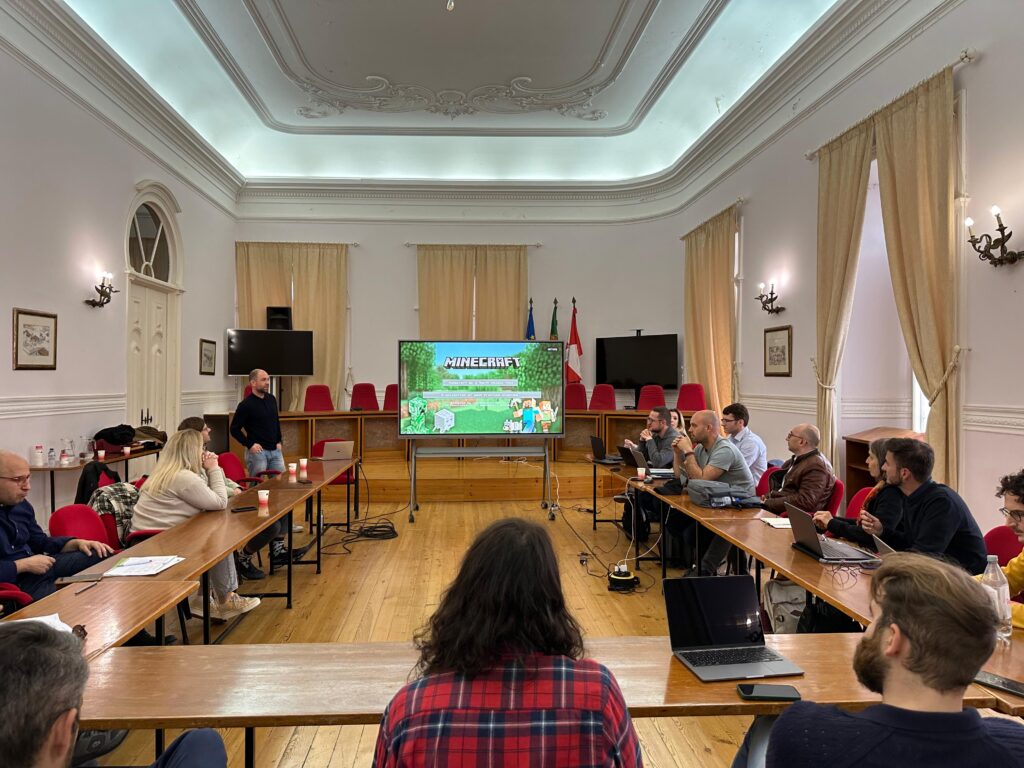Minecrafting for Resilience – A Different Perspective
Youth involvement in city planning is no longer a distant ideal—it’s happening now in creative and unprecedented ways. More than just residents, young people are increasingly viewed as key players in shaping the future of their cities. The European Youth Goals highlight the importance of empowering young people to actively participate in decision-making processes, particularly in designing youth-friendly urban spaces.
But how do we engage youth in ways that resonate with them? Enter Minecraft—a digital tool that has become more than just a game. With its versatile design environment, Minecraft is being used by cities to foster youth participation in urban planning. Through this platform, young people can envision and build public spaces that reflect their own ideas and aspirations for the future.
The idea behind Minecraft for Resilience is simple yet transformative: by giving young people a virtual platform to express their ideas, cities are offering them a tangible way to influence real-world change. The MC-YOU Project taps into this concept, allowing young people to step into the role of “MCs”—the emcees of their communities—giving them a voice in urban development processes.
Scientific studies on gamification and policy engagement show that interactive platforms like Minecraft foster meaningful participation. The immersive and creative nature of the game enables young people to better understand the complexities of urban planning, while also equipping them with the tools to propose sustainable solutions. In this way, youth are not merely participating—they are leading.
The MC-YOU Project seeks to capitalize on the popularity of Minecraft, which boasts around 170 million monthly users, to engage young people in shaping their cities. Through structured workshops, interactive sessions, and peer exchanges, the project brings together young citizens, urban planners, and policymakers to collaboratively design resilient urban spaces.
The process is grounded in five key phases:
Analyse & Commit: Participants explore how Minecraft has been successfully used in youth engagement across several case studies. The engagement activities gather practitioners, policymakers, and young people to learn, exchange and brainstorm on ways to strengthen youth participation in resilient city planning.
Educate & Empower: Young people are trained as MC Multipliers, gaining the skills to further engage their peers and local communities. By the end of this phase, the project will have trained multiple young people who will then form Minecraft teams across piloting cities.
Consult & Develop: Using the Agora Methodology, the project creates spaces for public consultations, where youth present their ideas and receive feedback. They then refine their proposals through Minecraft workshops, repurposing urban spaces dedicated by the municipalities based on the results gathered from the consultation process with the citizens.
Advocate & Sustain: Advocacy efforts involve holding public hearings where youth present their final urban projects, developed through Minecraft, to city policymakers. The project will produce policy recommendations to ensure that these youth-driven initiatives become part of long-term urban planning strategies.
Celebrate & Multiply: The final phase includes awards ceremonies and sustainability conferences to promote the ongoing success of the MC-YOU model across other cities and regions.
With the first cities of Riga, Faro and Sandanski joining to pilot the MC-YOU model, the results are beginning to speak for themselves. By blending traditional policymaking with innovative, youth-driven approaches like Minecraft, cities will be able to foster resilience and sustainability while building trust between generations. The model offers new perspectives on how young people can be active participants in shaping policy, instead of remaining as passive beneficiaries.
Initial results from the MC-YOU Project are promising. The collaborative design process between youth, educators, and city officials is leading to more vibrant, inclusive, and resilient urban spaces. The next phase of the project aims to gather comprehensive data on the long-term impacts of these youth-driven initiatives, which will be shared in upcoming publications.
